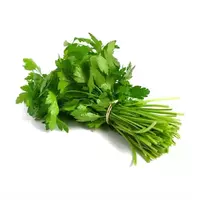Parsley

The birthplace of this greenery is the eastern coast of the Mediterranean Sea, more specifically Spain. There, parsley is still found in a wild form among the rocks, but near water sources. The name of parsley comes from the Greek word "petros, " which means "stone, " which indicates a favorite place for greenery to grow. In Greece, parsley began to be grown since ancient times, where it became a symbol of glory and joy. From the 9th century, its spread began throughout Europe.
Parsley was originally used as a drug to heal wounds from venomous insect bites. It was for this purpose that parsley began to be grown in Russia. After that, people realized that greens are perfectly combined with vegetables, both fresh and stewed, as well as with fish and meat. It is especially valuable that even with prolonged heat treatment, the beneficial properties of parsley are preserved, and its taste properties only increase. The same is the case with freshly frozen greens - nutrients and, accordingly, benefits for the body, can be preserved in it for several months. The calorie content of parsley reaches 49 kcal. per 100 gr.
Benefits of parsley
What is the secret of the miraculous properties of parsley? First of all, it contains a lot of vitamin C, significantly exceeding the same value in many vegetables and fruits. So 100 gr. parsley contains almost two daily limits of this priceless vitamin. Thus, parsley is ideal for strengthening the immune system, for the treatment and prevention of seasonal vitamin deficiency, scurvy. In terms of the amount of carotene, parsley is in no way inferior to carrots. In addition, it contains a significant amount of vitamins V1, V2, folic acid, potassium salts, iron and magnesium.
A unique substance - inulin, which is part of parsley - regulates the processes of glucose exchange in human blood. Therefore, the benefits of parsley are revealed in the fight against diabetes mellitus. Parsley is also useful for various kidney diseases, bloating, intestinal colitis, gastritis, ulcers, and in general for any inflammatory processes and weakening of vision. Parsley is indispensable for combating edema, and of various origins - both renal and cardiac. Parsley also has an amazing effect on the oral cavity - it whitens teeth perfectly, strengthens the health of the gums.
In addition to leaves, seeds and parsley root are actively used in folk medicine. A decoction of them helps when eliminating freckles, pigment spots and eels on the face. The skin becomes fresher after the decoction is applied, the delicate skin around the eyes tones and becomes smoother, the facial lines are smoothed. Parsley also has a beneficial effect on hair growth, compresses made from crushed seeds are used to prevent baldness.
Harms parsley
The plant has practically no evidence of use. Only people suffering from acute kidney disease can harm parsley. In addition, you should be careful about where parsley was grown in order to minimize the amount of nitrates entering the body. And, of course, before eating parsley, like any vegetable, you should thoroughly rinse.
parsley 49 kCal
Energy value of parsley (Ratio of proteins, fats, carbohydrates - ju):
Proteins: 3.7 g (~ 15 kCal)
Fats: 0.4 g (~ 4 kCal)
Carbohydrates: 7.6 g (~ 30 kCal)
Energy ratio (bj | y): 30% | 7% | 62%
 Español
Español Français
Français Português
Português Русский
Русский 简体中文
简体中文 繁體中文
繁體中文 日本語
日本語 한국어
한국어 العربية
العربية Türkçe
Türkçe Қазақ
Қазақ Deutsch
Deutsch Italiano
Italiano Українська
Українська
